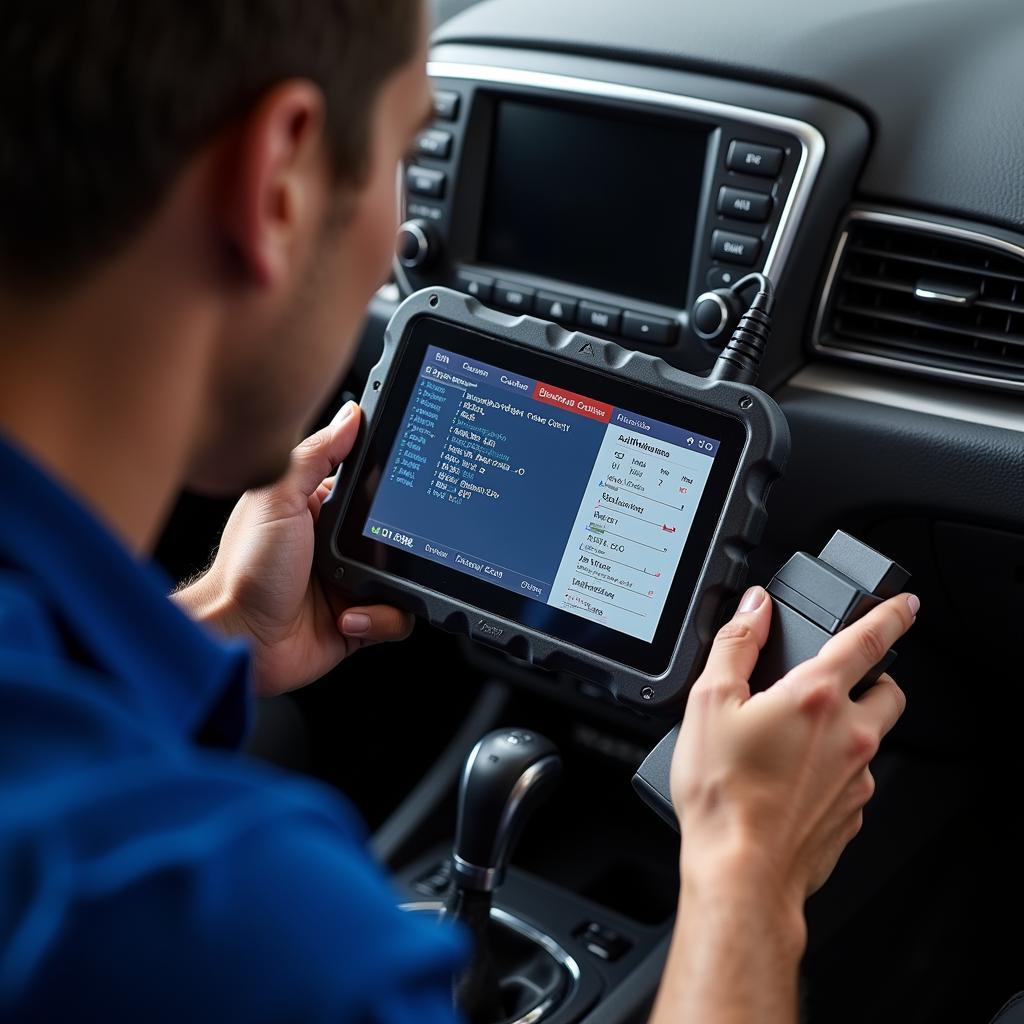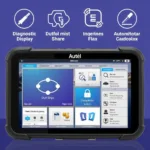Taking care of your car involves more than just regular oil changes and tire rotations. A crucial aspect of modern car maintenance is the use of dealer scanners, also known as diagnostic scanners. These powerful tools allow you to delve deep into your vehicle’s systems, identify problems before they become major headaches, and ultimately, take better care of your automotive investment. This guide will equip you with the knowledge you need to understand and utilize dealer scanners effectively.
Understanding the Power of Dealer Scanners
Dealer scanners provide a window into the electronic control units (ECUs) of your vehicle. These ECUs are the brains behind your car’s various systems, from the engine and transmission to the airbags and anti-lock brakes. By communicating with these ECUs, a dealer scanner can retrieve diagnostic trouble codes (DTCs), which pinpoint specific issues within these systems. This allows for targeted repairs, saving you time and money.
Why Choose a Dealer Scanner?
While generic OBD-II scanners can read basic codes, dealer scanners offer a much deeper level of functionality. They provide access to manufacturer-specific codes and data, allowing for a more comprehensive diagnosis. This is particularly important for modern vehicles with complex electronic systems. Think of it like this: a generic scanner is like a general practitioner, while a dealer scanner is a specialist.
How to Take Care of Your Car with a Dealer Scanner
Using a dealer scanner effectively requires a bit of know-how. First, locate your car’s OBD-II port, usually found under the dashboard on the driver’s side. Connect the scanner, turn on the ignition, and follow the on-screen prompts. The scanner will then communicate with your car’s ECUs, retrieving any stored DTCs.
Interpreting Diagnostic Trouble Codes (DTCs)
DTCs are presented as alphanumeric codes, each corresponding to a specific issue. While you can often find DTC definitions online, using a reliable database or repair manual is essential for accurate interpretation. Remember, a DTC is a starting point for diagnosis, not a final verdict. Further investigation may be required to pinpoint the root cause of the problem. This is where the advanced capabilities of dealer scanners truly shine, providing detailed data streams and other diagnostic functions.
Choosing the Right Dealer Scanner: Taking Care of Your Investment
With so many dealer scanners on the market, choosing the right one can be daunting. Consider factors like vehicle compatibility, software features, user interface, and budget. Investing in a high-quality scanner is an investment in taking care of your car for the long haul. Perhaps you are looking for the easiest fish to take care of, but choosing a dealer scanner requires a different kind of care and research.
Key Features to Look For:
- Vehicle Coverage: Ensure the scanner supports your specific make and model.
- Software Updates: Regular updates are crucial for staying compatible with the latest vehicle technology.
- Bi-directional Control: This feature allows you to test components and perform certain functions, aiding in diagnosis and repair.
- Data Logging: The ability to record data over time can be invaluable for troubleshooting intermittent problems.
Taking Care of Your Scanner
Just like your car, your dealer scanner requires some level of care. Store it in a safe, dry place, and keep the software updated. Protecting your investment in a dealer scanner will ensure it continues to serve you well for years to come, just as taking care of Maya Netflix subscribers want to protect their children. It’s important to treat your tools with the same care you would your vehicle.
Conclusion
Taking care of your car in today’s world requires embracing technology. Dealer scanners provide a powerful tool for diagnosing and addressing issues before they become major problems. By understanding how these scanners work and investing in the right one, you can take control of your car’s maintenance and ensure its longevity. Don’t just hope that God will take care of you and your car; take proactive steps to maintain its health. Just like learning how to take care of rosemary or how do you take care of an orchid requires specific knowledge, so does maintaining your vehicle.
FAQ
- What is the difference between a dealer scanner and a generic OBD-II scanner?
- How do I find the OBD-II port in my car?
- What do I do after retrieving a DTC?
- How often should I use a dealer scanner?
- Can I use a dealer scanner on any car?
- What are some important features to consider when buying a dealer scanner?
- How do I update the software on my dealer scanner?
Situations with Frequently Asked Questions:
- Check Engine Light On: What does the code P0300 mean? How can I diagnose it using my dealer scanner?
- Car Won’t Start: Can a dealer scanner help me identify why my car won’t start?
- Intermittent Problems: How can I use the data logging feature on my dealer scanner to diagnose an intermittent issue?
Suggested Further Reading:
- How do you take care of an orchid
- How to take care of rosmary
- God will take care of you
- Take care of Maya Netflix
- Easiest fish to take care of
Need Support?
When you need assistance, contact us via WhatsApp: +1(641)206-8880, Email: cardiagtechworkshop@gmail.com or visit us at 276 Reock St, City of Orange, NJ 07050, United States. We have a 24/7 customer service team.



